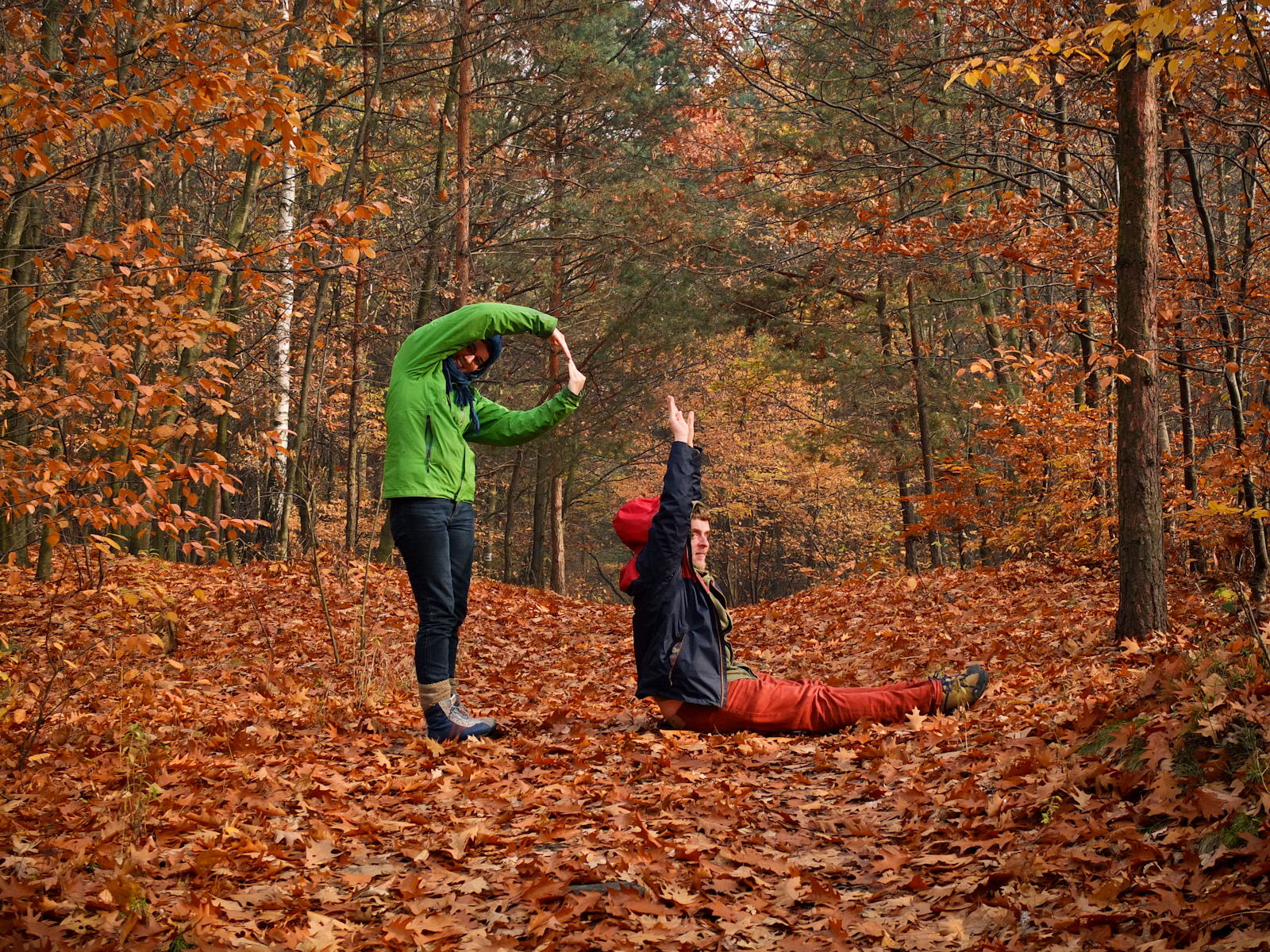
Real food Russia
Russian language does not have the word “organic”. Or, it technically does, but no-one uses it. Rather they use the word “artificial” when speaking about food produced with the use of chemical fertilizers, pesticides, herbicides or GMO crops. And in Russia, even for those living in the cities, it is very possible to choose to consume non-artificial foods. Natural food is abundant in Russia, and we’re meeting all sorts of people who understand and value the importance of such food.
“The food has soul, spirit to it.” Says Nastya, a Ukrainian now living in Moscow. “When I go into a supermarket, the food is apathetic. I have no appetite for it. I grew up going to markets in the West Ukraine where you buy eggs off one lady and cheese from another. And I choose this one because I like her hands. Here, there is a direct transaction of the food, from one hand to the next. Perhaps fancy restaurants in Moscow make attempts to bring back this spirit to the food. Or maybe I’m just told to believe it’s there. But the transaction is indirect there. I don’t know the process.”
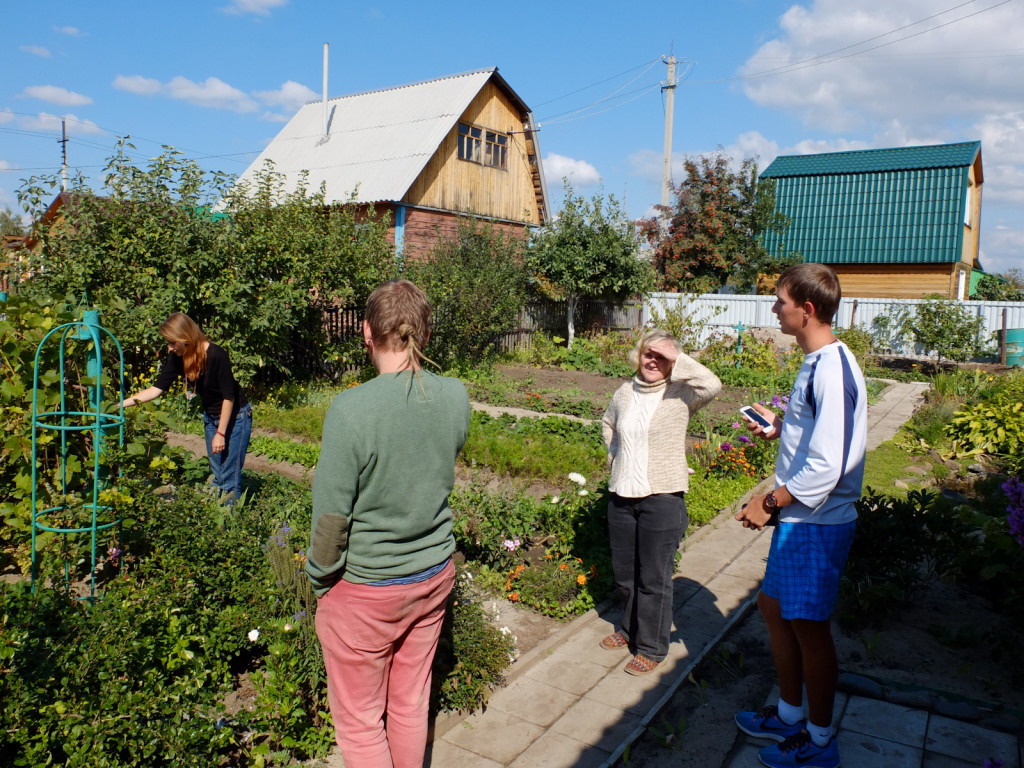
Dacha living, in the outskirts of Novosibirsk. Elena’s mother is retired now and is very happy spending time in her garden.
We’ve lucky to spend some of our time in Russia staying in the countryside. In the villages and towns nearly everyone has a large garden, in which they grow fruit and vegetables. Apple trees spilling fruits – no one complains about the spots or imperfections. Berry bushes giving their last fruit before the winter. Carrots pulled from the soil. And of course, potatoes. “We have a joke in Russia,” Tells Olga, our host in the Ural Mountains. “You can be a millionaire, rich with all the money in the world. But you’ll still have to go to the field and help your family dig potatoes!”
Small stalls line the Russian roadsides, offering fruits and vegetables. People can make some extra money selling their excess produce to cars passing by. “The pensions are quite good now, and these people in the villages grow most of their food, so save most of the money. They can make some extra cash on what they sell on the roadside.” Says our truck driver (for whom we are the first foreigners he’s ever met!)
It is amazing for me to be in a country where here there are white people who still have traditions. Preserving food through pickling, drying or making juices is the norm, and we’ve stayed in many houses where people are busy with these preparations for the winter. “You’d be mad not to make preserves,” Tells Katya, whose family doesn’t have a garden, but are preserving fresh tomatoes from the market. “Fresh food is just too expensive in the winter.” People understand the forests and often go foraging for mushrooms or collect herbs from the mountains to make their own teas. Really, I have been drinking some of the best herbal teas of my life in Russia. We’ve even tried a special jam made of pine cones!
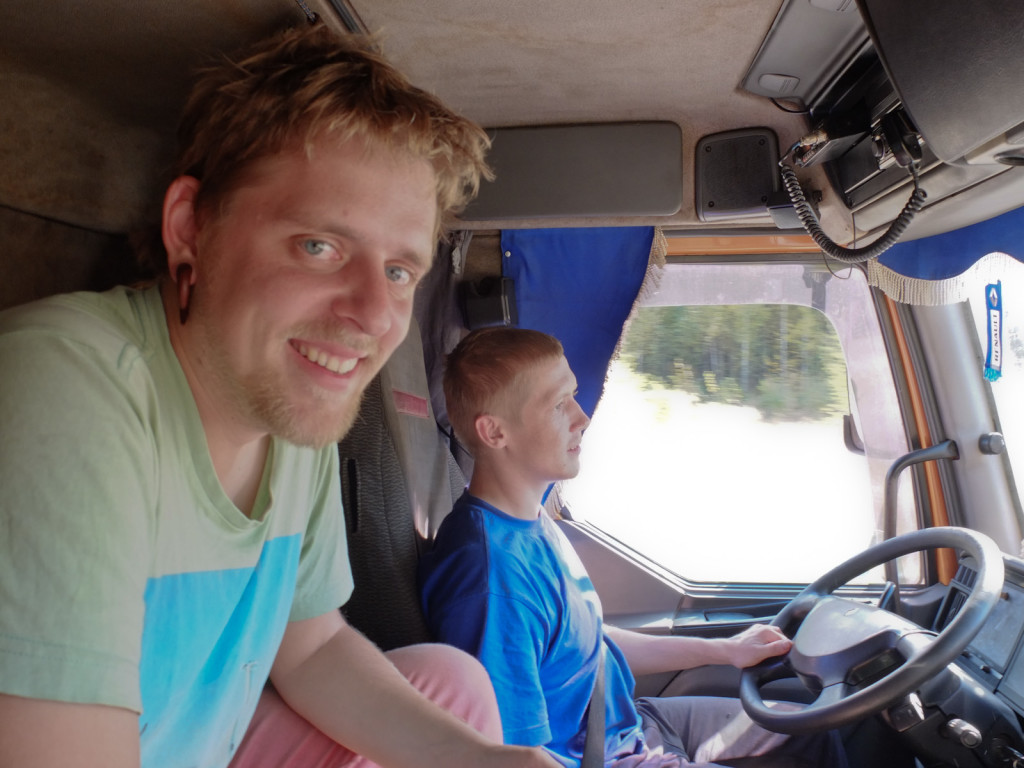
Our favourite truck driver. He was very excited as we were the first people he’d met from abroad. He’s 31 years old.
Russian people, from all walks of life, have knowledge of traditional medicines and natural remedies for good health. People talk about the healing properties of honey from different regions (but better not put it in tea or the properties are killed.) Even our truck driver told me how healthy the berries being sold roadside are – use them to make a juice that is the best hangover cure! As well as fruit and vegetables, it is also common to see stalls selling bunches of dried oak leafs along the roadsides. These are for hitting against the skin during the Russian banya (sauna), to intensify the heat and sweating, very good for cardiovascular health, they tell me. Olga, a recent mother, was even taking 2 month old baby Zara into the banya! Apparently, it’s good for the baby’s immunity. The family was also keeping baby Zara’s pram just outside the kitchen window when she was sleeping. Olga tells me babies sleep much more peacefully when they have cool, fresh air, rather than the air with heating in the house. Even in when it’s -30, babies are put outside for naps during the day and not only for good sleep but mostly for strong immunity… Of course the pram is covered with a blanket and baby checked regularly to make sure they’re not freezing!
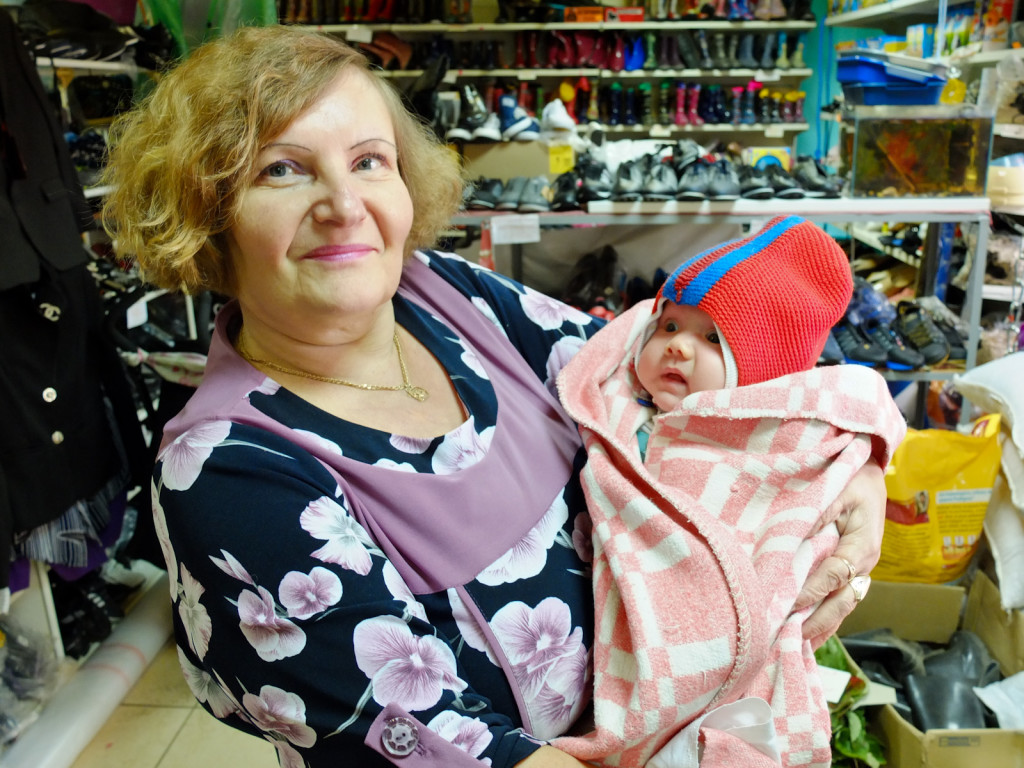
Baby Zara with her Auntie who is an independent shop owner – something that seems an old fashion idea to us in Australia now!
But how have these food traditions survived in Russia, when they have long been forgotten and replaced by mass production and everything-all-the-time supermarkets in The West? Well, 70 years of communism can give us some of the answers. “I remember my parents turning off the refrigerator in our apartment because there was no food to put in it,” Told one of our drivers, recalling the crisis of the 90s when the Soviet Union was falling apart. “There was no food in the shops. People were even stealing window wipers off cars, hoping to get some money for food.” During these times, often the only food people had, was that which they could grow themselves. “Nowadays, many people buy a dacha (Russian summer-house) so they can grow at least some of their own food.” A truck driver explained. “It gives them a sense of security.”
So, though the food growing culture comes out of times of hardship for Russian people – times of no freedom of speech – it has kept alive some of the freedom we in the West have close to lost: freedom of choice. On leaving Russia and entering Estonia (a former member of the Soviet Union, now a European Union member where people highly depend on bank credits) our first driver, a Russian living in Estonia, put it well when comparing the two countries: “[In EU] It’s a new “democratic” system: everybody has money but nobody has anything. And in Russia people have no money but they have everything they need.” The grandmothers who try to sell their vegetables or jams at the roadsides in Australia would likely be shut down for not having licences to prove hygienic production! I’ve seen how people’s efforts in their gardens gives them ultimate independence from their government (whom they have long ago learnt, cannot be depended upon.) It’s devastating that the borders of Russia are getting harder for people to move across, because we have so much to learn from what’s going on inside this vast country.

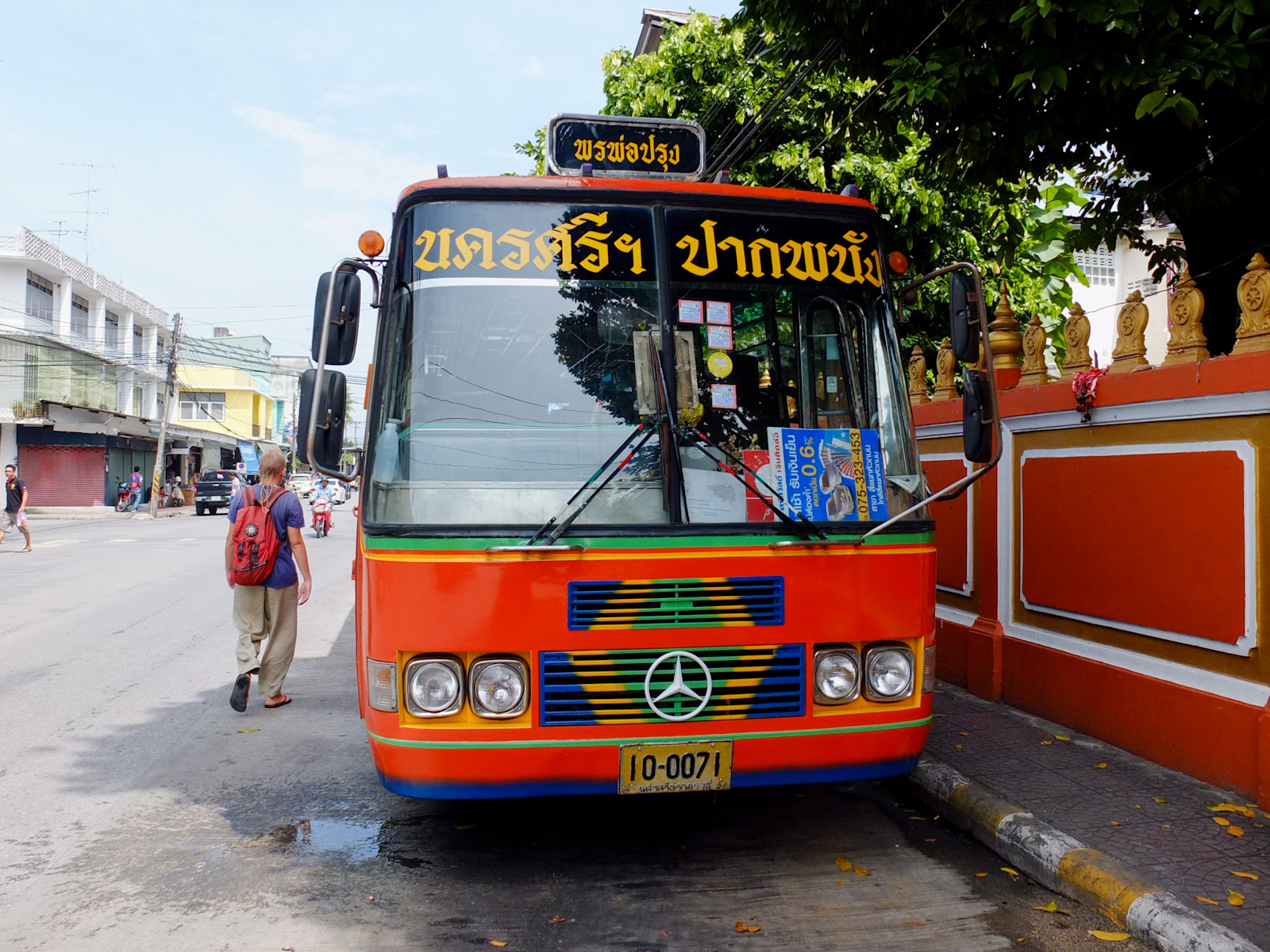
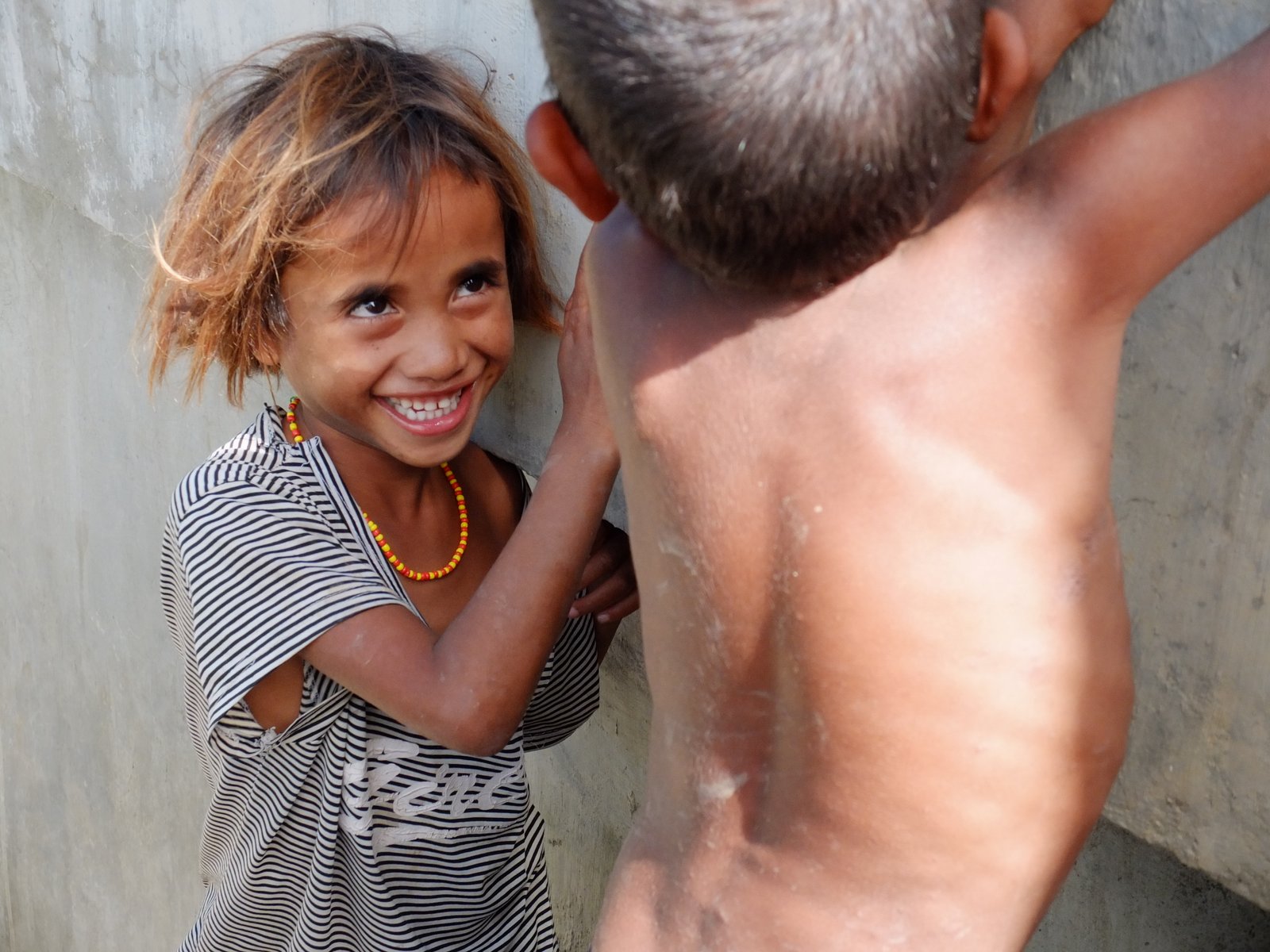
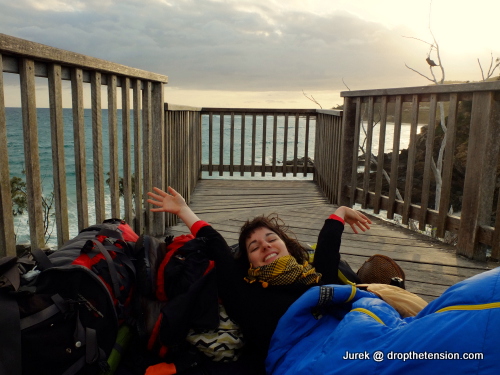
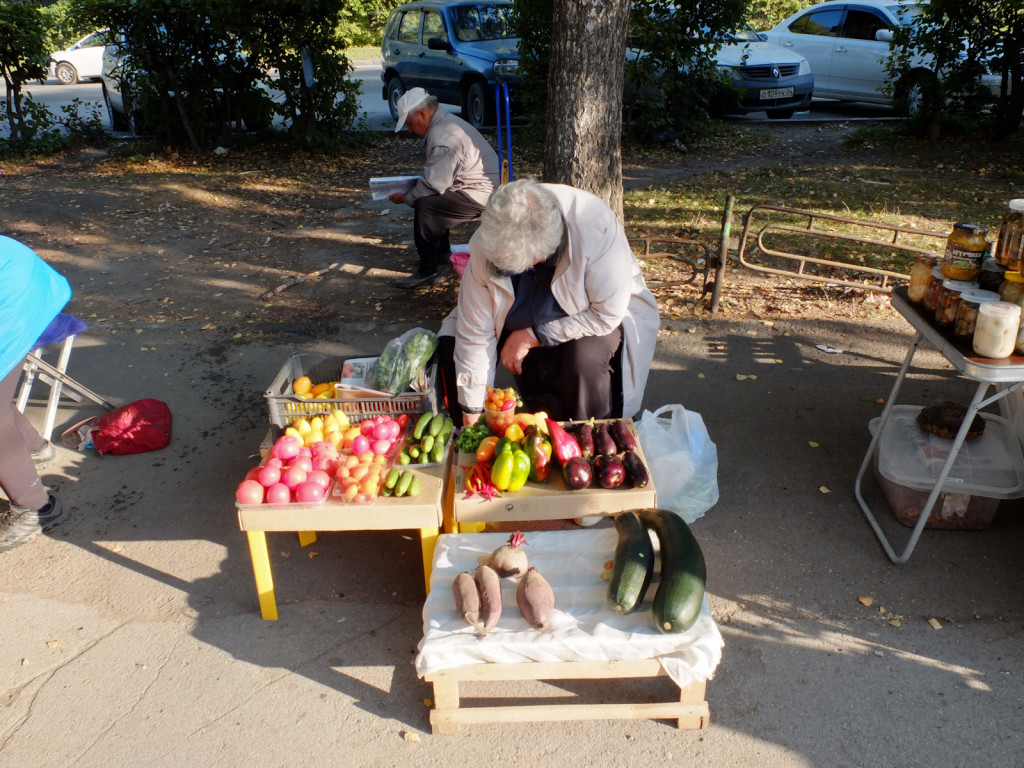

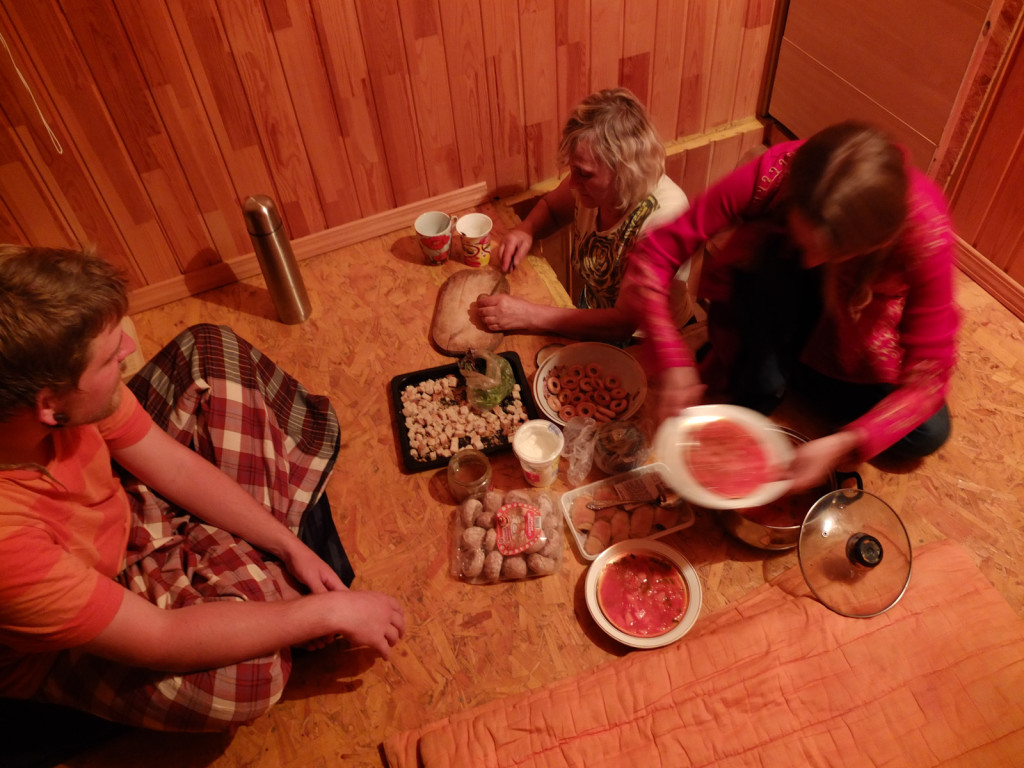
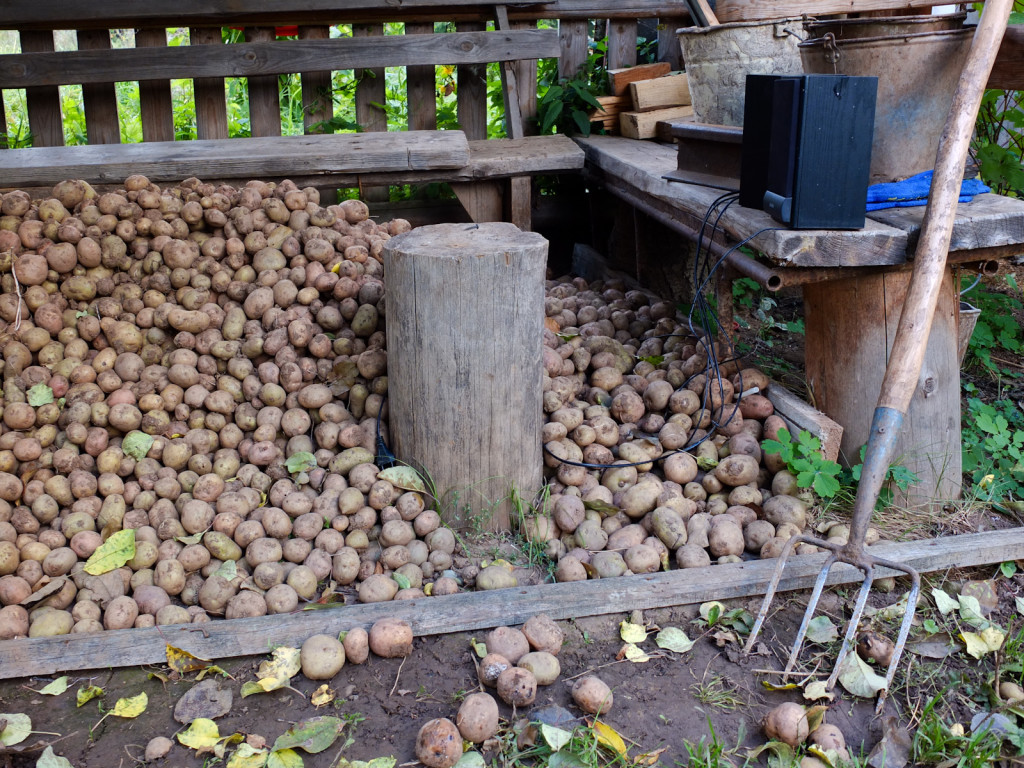
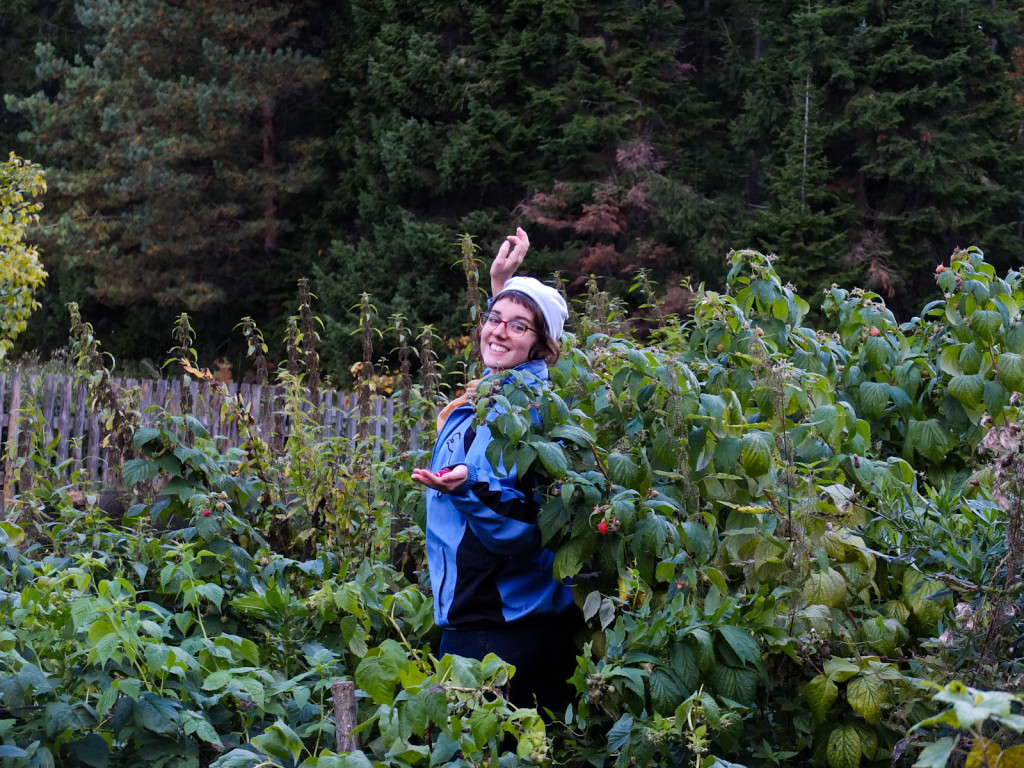


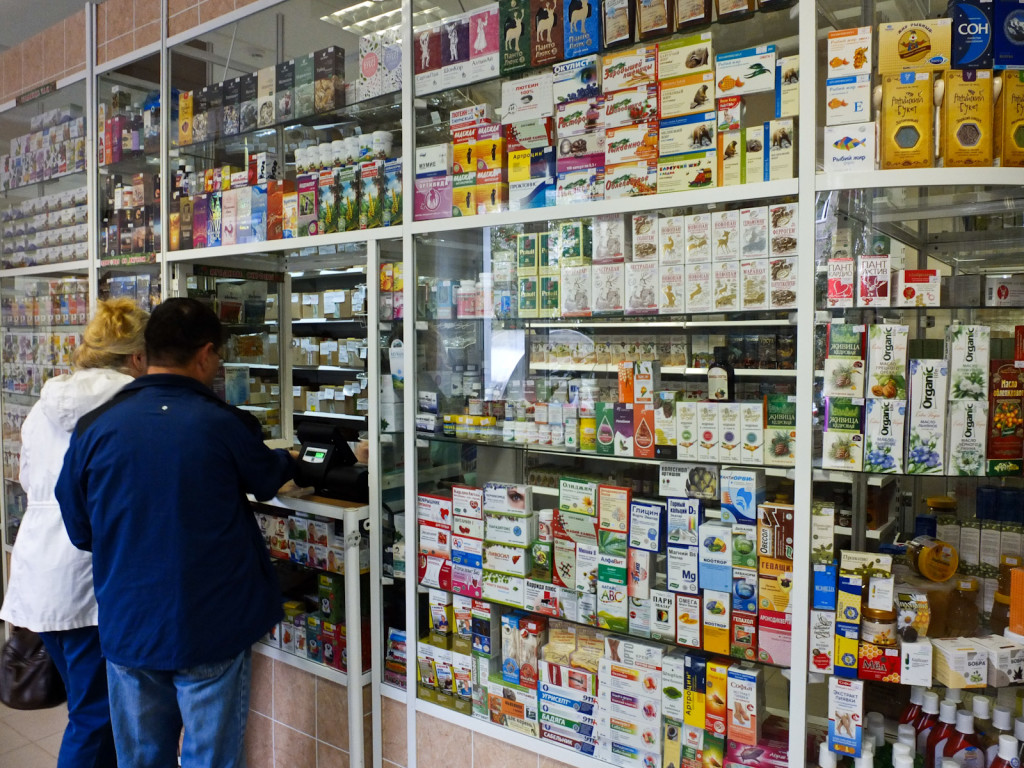
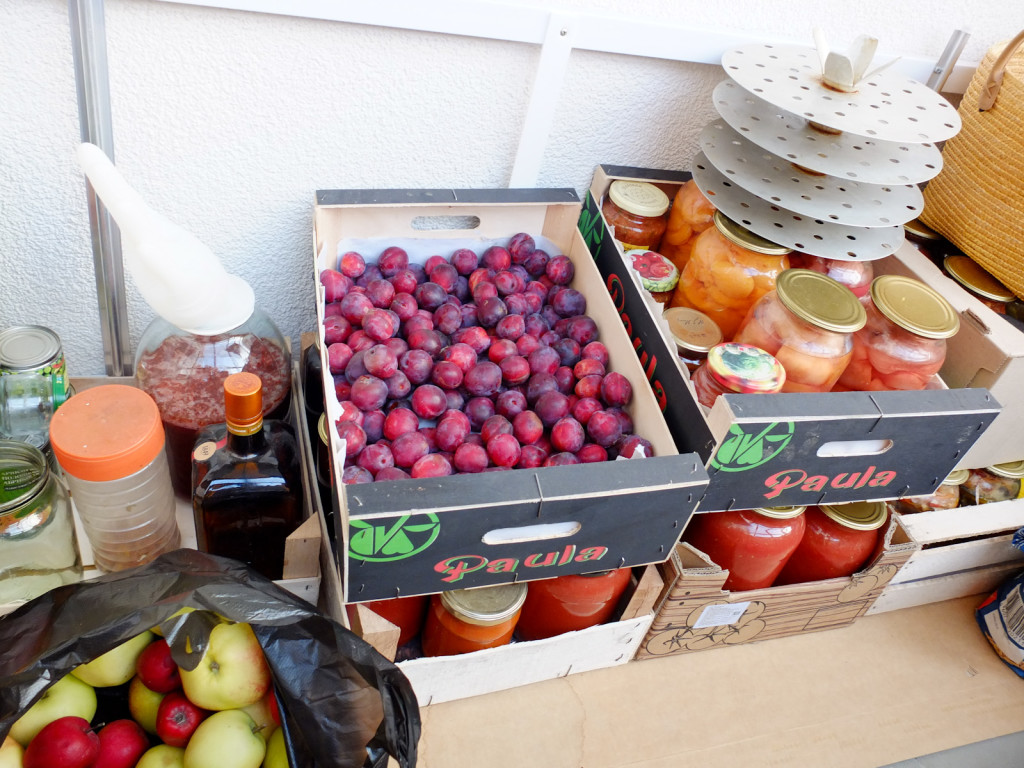
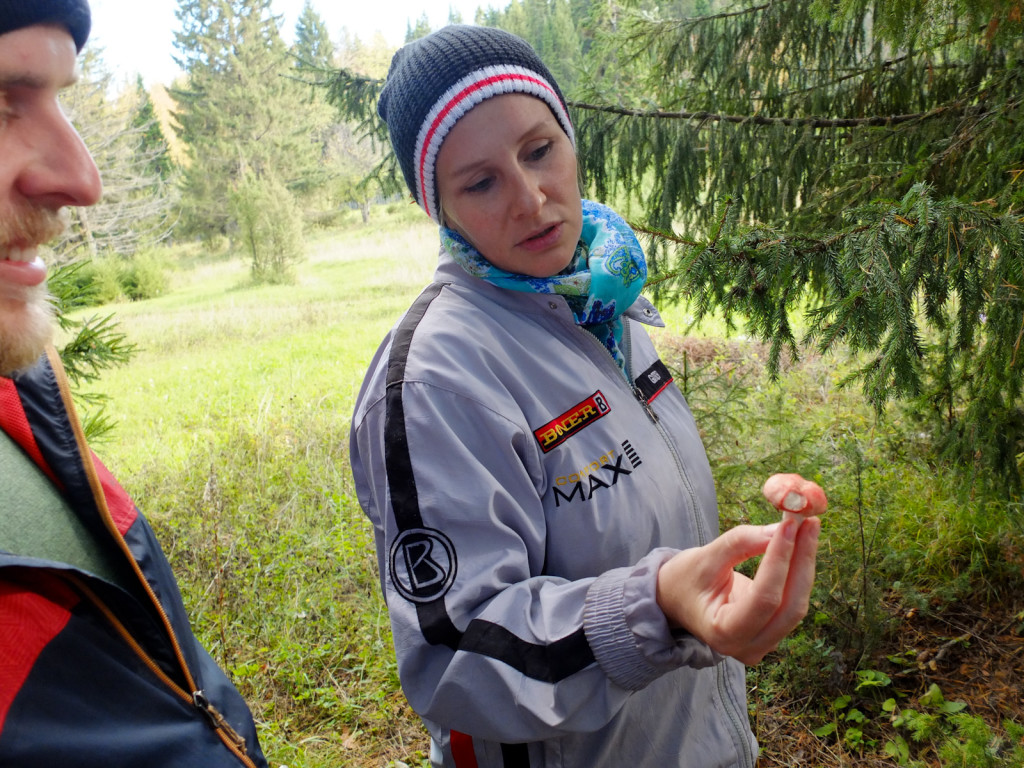

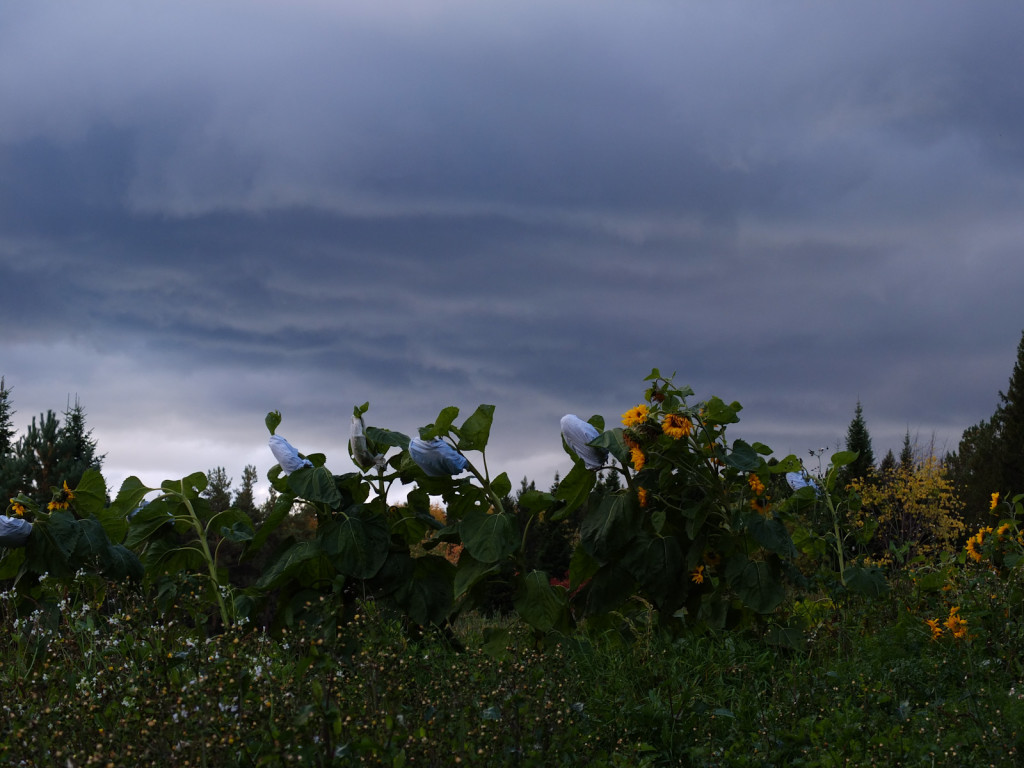
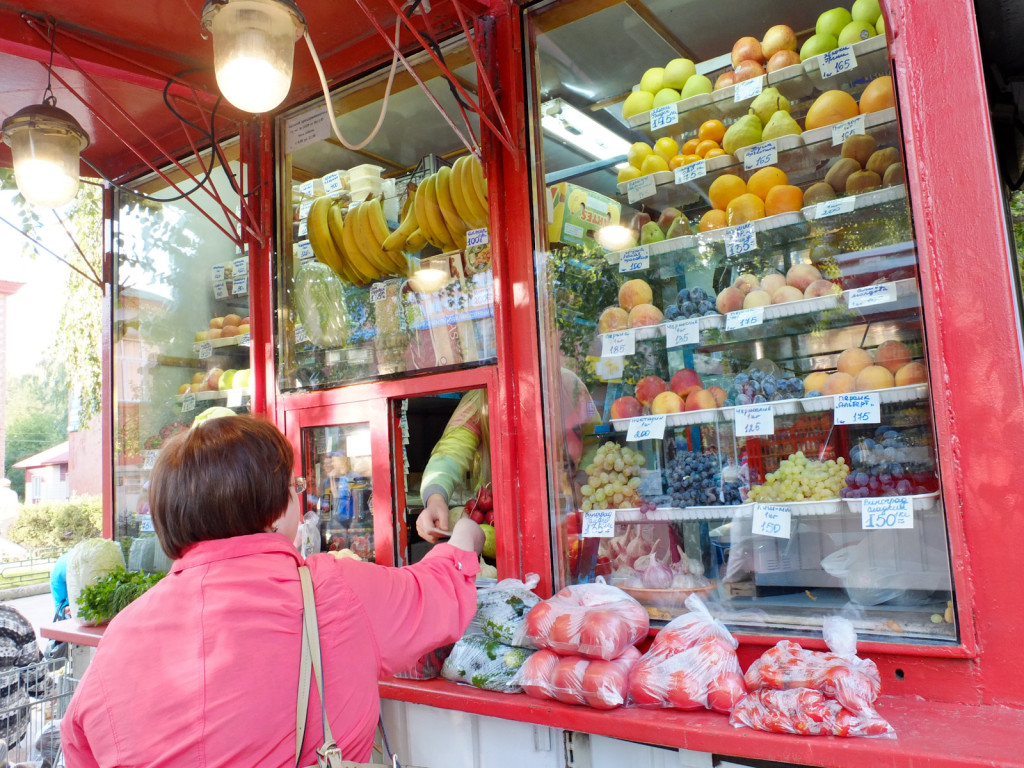
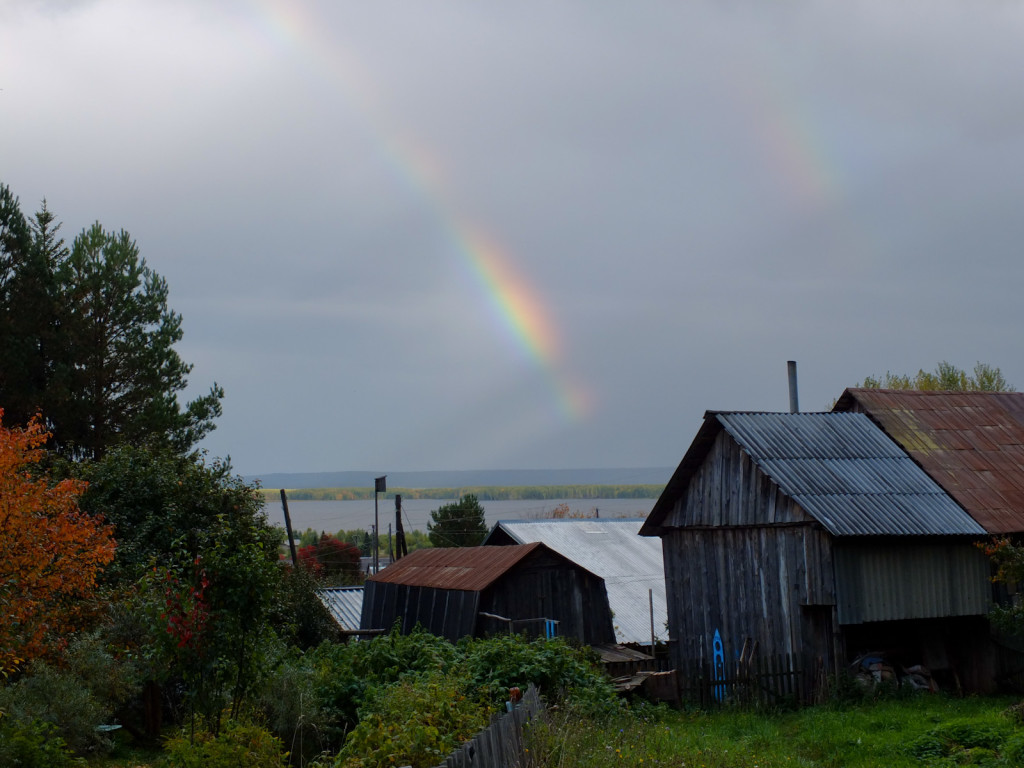
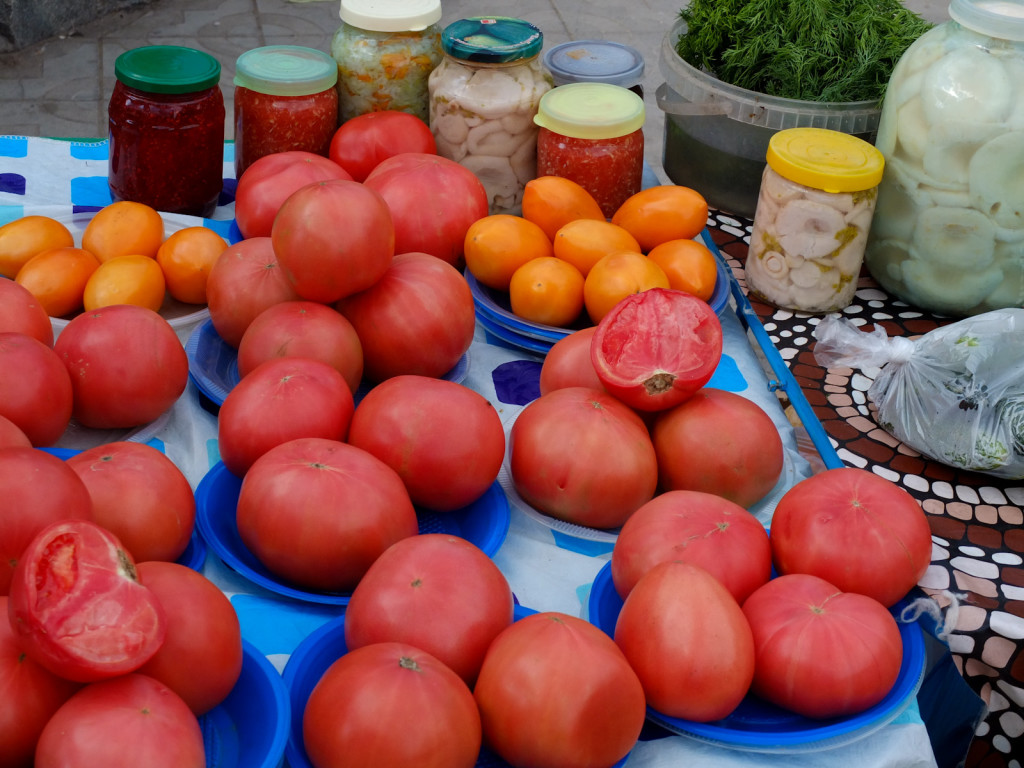
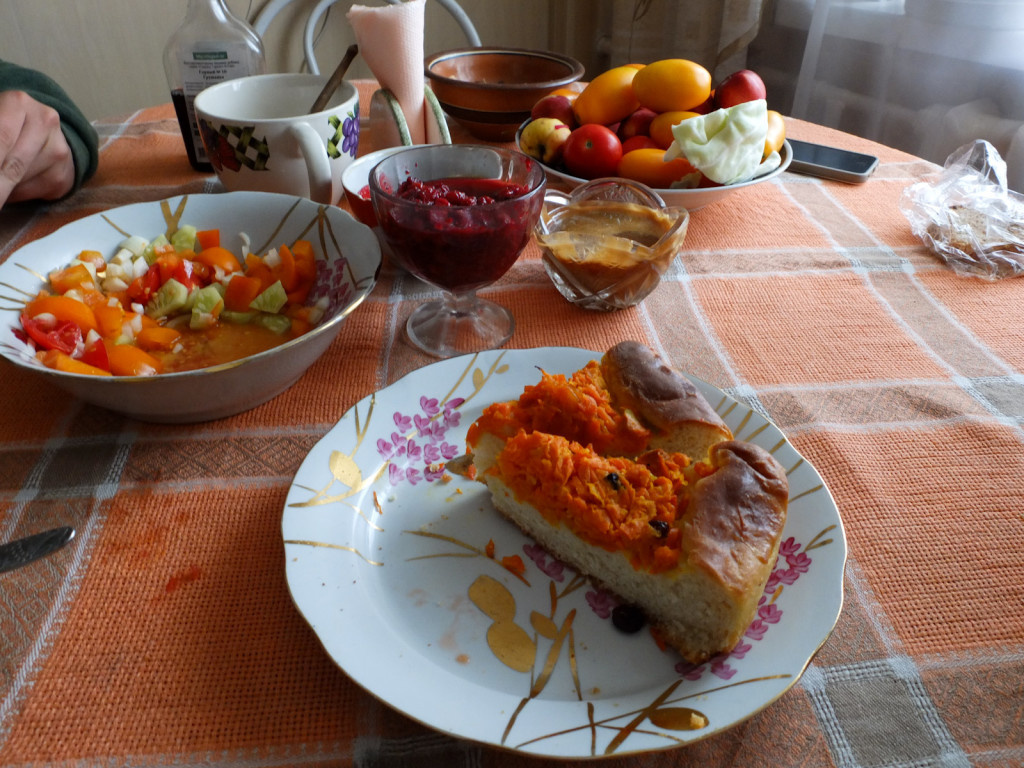

“In the villages and towns nearly everyone has a large garden, in which they grow fruit and vegetables. Apple trees spilling fruits – no one complains about the spots or imperfections. Berry bushes giving their last fruit before the winter. Carrots pulled from the soil. And of course, potatoes. “We have a joke in Russia,” Tells Olga, our host in the Ural Mountains. “You can be a millionaire, rich with all the money in the world. But you’ll still have to go to the field and help your family dig potatoes!”
And here we go. U gave answer to my question placed under Ur last entry.
Most of Russians are not used to Western level of consumerism.
but in the villages most of ppl have so low income they just simply can’t afford buying all food from shops.
And the home grown food stands for a significant share of the staple food. Far in the east Syberia it may provide up to 75% of the calorias needed.
Due to inherited knowledge from our fathers and grandpas generation we all here behind the iron curtain have been thought a way of living with practices now ranked as sustainable & resilient. Barrels of souercraut fermenting in the cellar, dried sausages danging in the attic, and jars ful of preservs in the pantry were mere ways to simply stay on the proper side of biological treshold.
When I first met Jurek in Moldova I was taken to a ground cellar by our common host’s grandma. It was full of empty pots and jars. There were few of them full and those we took out to prepare a meal.
Later on I asked why there were so many of them empty.
The answer was logical :”we emptied them to eat during the winter”: it was May and the fruit saison didnt start yet.
My question was what happened if they ended: answer was simple, “we will starve or get a help from neighbours.”
The grandma could hardly believe in the idea of agrotourism and was loughing @ ppl who come to a village and pay for possibility to work.
enough of words – getting back to preserving tomatoes : -)
May U never have a cramp in ur thumb.
Amazing article. I so wanna go. Nice pants Jurek.
You should definitely go!!! So much to learn from this place and home to some of the nicest people on our way. 🙂 See you soooooon!!!!
Yes, yes, yes! Thanks for adding this for us. May Russia not get use to the Western level of consumption and teach the rest of us the forgotten qualities of frugality and thriftiness!
Wendy! it is not about the country, it is all about access to resources. (euphemism for poverty)
We just simply had it very very limited thus gaining skils allowing simply biological survival.
Nowadays the access to limited resources is guaranteed to a constantly shrinking # of ppl (even ithe west and the constant and neverending growth is not possible so the basically we are going to see a renaisance of the old good tried and tested methods.
I can see some sympthoms happen now. growth of alternative ways of living.in alternative societes. it is happening. maybe not yet in whole australia but…thats why i’m hoping for good perspectives for the west. as it has already done its lesson and find out consumerism is not the solution.
btw. are U going to enter PL any time soon? I’m asking as this week we’ll stay @ our cottage in the middle of Poland. ()
Cool! More people turning to other ways of living – I like the sound of that 🙂
We’ll be coming into Poland around the start of November. Where are you usually based? Cottage life sounds lovely 🙂
Hey!
Sorry for late replying, it’s really hard to keep up with the correspondence and not forget we’re still travelling 🙂
As much as I agree with you on what you write, I think it’s not only the access to resources but also the cultural answer to it. For instance the British, faced by limited resources, colonised Australia in the style of brutal, practically unlimited exploitation and although Australian society has been raising to grow its own food, it’s just a fraction of the society for which exploitation of the land is the ‘natural’ way (you must go to the outback to see it with your own eyes; most Aussies never had a chance to realise it I guess). When it comes to the Russians, they’ve been just doing what they always have, oppressed they preserved the ancient wisdom of living in harmony with nature. So it is a bit about the country 🙂
Cheers and see you somewhere sometime soon!
Jurek
Blah! “When it comes to the Russians, they’ve been just doing what they always have, oppressed they preserved the ancient wisdom of living in harmony with nature. So it is a bit about the country”
Pretty partisanal outlook I must say.
What is the difference in the act of subjugating Australian aborigens by England and native syberian tribes by Russians?
Most of what U called ‘ancient wisdom’ are a valubale techniques brought into the hinterland by those imprisoned and send there to “serve their duty”.
As to “living in harmony with nature” go and pay a visit to any of the industrial monocities :-). IMHO htere is no nation paying less attention to protecting the enviroment than Russians.
As to aussies living in the wealth bubble makes U not to worry about anything than the end of ur nose. but the awakening may be highly painful.
Have U read Jarred Diamond book “Strzelby zarazki i maszyny”?.
The volatility of the australians society way of living and causes that have led to it are well explained.
OK, I simplified it way too much but you must remember that I seemingly have much less time for online discussions than you do 😛
Generally, I was speaking about the attitude of the people, not government. In Russia it was mainly ‘we need to leave closer to the land and help each other because we can’t depend on our government/living in industrial areas is bad/we are happy because we live close to the nature and each other/indigenous pepoles have their faults but they also have beautiful, valuable traditions, often in connection with nature or spirituality’. In Australian outback the attitude we were coming across way too often was ‘we should take as much as we can from this land as we can because it belongs to us and using it makes us stronger/we shouldn’t use alternative energy sources because it’s all extremist propaganda/Aboriginals are all racist drunkards, I hate them’.
That’s of course not the attitude of the majority of Australians (or Russians), but the cultural extremes we came accross, the impressions they left.
I’ll gladly read the book!
as to free time..When I decided to follow the blog I counted also in “wasting” my precious time for commenting (provoking a wider view?). :-). Soooo… here I go.
There is a groundswell of Russian propaganda presenting this country as the one possessing a certain alternative to western consumerism which is merely searching for a new generation of “pożytecznych idiotów”. What makes me profoundly worried it is finding them.
I fiercely oppose it.
I started suspect U got infected with it.
U know I do get along well with Russians at most of level but I disregard their attitude towards their government and lack of resistance to national propaganda.
The inborn drive to imperialistic way of thinking” divide et impera”
IMHO most of the ppl in RUS glubinka U prised so much would instantly give up their way of living once offered the ability to work & live in Moscow while on the contrary the postmodern Western World which U seem to disregard more & more gives a birth to a social movements towards sustainable ways of living.
btw In on of the entries U claimed there is no word “organic” in the RUS lng, bear in mind there is also no word “alternative” as to the way of behavior or living. AFAIK the closest meaning is “nieformał” which contains a tilt of disregard.
One shall not offshoot or outstand ot the mass…brrr… gray uniforms, aligned rows, heads up, praise the leader and urrrrra! v pieriod…!
terrible reminiscences.
U may not be any different…and most of Russians are no less racist than Australians. any other than blue eyed Slavic type of being is instantly ranked as chornokozhi, krugoglaziy, ili kakoy to drugoy Evenk.
btw don’t be surprised by the Australian outback attitude towards “energiewende”, especially in the mining states.
Their whole economy is coal-extraction based.
(the coal which is later brought to port of Rotterdam, then transported to Poland and still 30 % cheaper than the polish one ).
I do realise during travel one meets mostly marvelous ppl on his way but..
creating thesis of superiority of one nation (culture, way of living) basing at the travel experience only is.. a poor idea.
More than to a backpackers I’d rather give my ear to stories of expats who work in the country and must face its daily life.
So… I still do dare to maintain my opinon: IT is n o t about the country but access to (widely understood) resources (which aboundancy and easy access to makes ppl forget about Maslov’s triangle).
aha! as to :“For instance the British, faced by limited resources, colonised Australia in the style of brutal..”
as would a n y o t h e r c o u n t r y do if it had wear the british shoes i.e. to face exponentially growing population and thus shrinking resources.
They had to somehow utilize the excess number of local population to avoid social unrests. Fortunately there were new land “discovered”
Therefore the “sort of man” sent out to “rule” colonies was ..hm.. sorry to name it …say .. of rather poor quality.
Dear Rafał, you draw very distant conclusions from my “let’s respond a friend while having a morning coffe and tell him what we saw on our way” comments. I know you like to engage in discussions but we don’t have much to discuss as we mostly agree. I’m sharing some simple, not too deeply considered thoughts here, barely some impressions linked with the topic, not a conference paper on my full opinion on Russian and Australian societies and their policies through history. Please don’t try to conclude from them what I think about Russia altogether.
All I’m saying is, yes it’s true that it’s the poverty which makes people in grow their own food, but at the same time I believe that different cultures will produce slightly different responses to the same situation. For instance, I imagine it was much easier and more obvious for Russians to start growing their own food in the times of crisis than it would be for Australians.
I’m very far from declaring Russian culture’s superiority over Australian, I’m just saying that in this case it produces an outcome that objectively seems to me to be better. I am not commenting here on other aspects as I don’t want to go off-topic. Russians’ political afiliations for instance are a completely different question deserving a separate post (under construction).
I think really a lot has changed in Russian consciousness in the last years as the image we received was very different from what I had heard and read before. Many things have seemingly changed for the better (we haven’t heard hateful racist comments even once, the word “альтернативный” is indeed in use, you hear here and there about eco-villages being set up by sustainable-development-minded people etc.) while some have changed towards the very worst and really scarry (many of the opposition-minded people comparing it to Germany in 1930’s do seem to be right with most people’s resistance to propaganda falling below 0%…)
At the same time, as I have said before, these are our impressions and I’m far from claiming to draw an objective image of Russia or glorify it as a country or society.